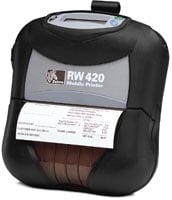Bar Code Labels Provide Inventory Accuracy Improvement To Cosmetics Manufacturer
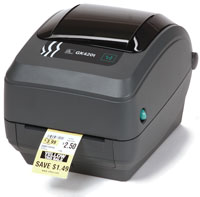 Challenge
Challenge
Bergen Brunswig, based in Orange, California, is the third-largest wholesale distributor of pharmaceutical and medical supplies in the United States. The distributor needed shipping software that could fit the needs of its new direct-to-consumer fulfillment service to various on-line drug stores, run on the company’s AS/400, and be easily integrated with its primary distribution system, ASW by IBS. The company also needed to integrate electronic scales and bar code printers to allow for package labeling and tracking.
Solution
Bergen Brunswig met its Internet Fulfillment Center’s shipping system requirements through software, produced and installed by an IBM Business Partner. The software integrates seamlessly with the IBS system, electronic scales, and thermal, on-demand barcode printers from Zebra Technologies.
Build-to-Order Made Easy With Bar Coded Work-in-Process Tickets
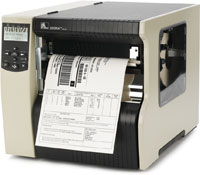 Challenge
Challenge
When a major Texas-based computer manufacturer made the leap from traditional order fulfillment to customized computer assembly, it had to employ a new system that would enable it to track the assembly process from the moment a customer places an order until the delivery of the finished product.
Solution
The company installed wide-format Zebra® printers to produce work-in-process (WIP) job tickets: letter-sized documents that provide specific assembly and delivery instructions and guide the assembly of each product until it arrives at the customer’s doorstep.
Hospitals Using Bar Codes To Improve Safety
More and more hospital patients are being treated like loaves of bread.
Pharmacists and technicians at the Lakeland Regional Medical Center use the Talyst barcoding system that assists pharmacists in accurately preparing and packaging drugs for patients.
That’s a good thing, nurses and hospital administrators say.
Like the scanner that reads bar codes in the grocery, Polk County hospitals are bringing bar-code technology to the bedside, all in the name of patient safety.
Medication errors harm at least 1.5 million people every year, with a conservative estimate of 400,000 preventable drug-related injuries in hospitals each year, the Institute of Medicine of the National Academies reported in 2006.
Bluetooth Mobile Printers Keeps Blue Devils Mobile
Bluetooth Mobile Printers Keeps Blue Devils Mobile
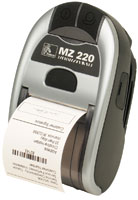 Challenge
Challenge
Whether watching their beloved Blue Devils play basketball or going about their business on campus, students at Duke University in Durham, N.C., are seldom standing still. The university’s widespread use of handheld computers serves students on the go with mobile concessions at events, portable point-of-sale for busy bookstores and other innovative offerings. Now Duke is implementing Zebra MZ 220 mobile printers with Bluetooth® wireless technology and new handheld computers so it can create more mobility and innovation.
The DukeCard is the school’s student ID card, which can also be used for purchases and services throughout campus and the surrounding community. The DukeCard office supports 600,000 daily transactions from nearly 1,800 card readers. Duke University Stores, which runs 25 different retail and office services operations on campus, generates the most sales per student of all independent college store systems in the United States. Campus retailers and student organizations can also process DukeCard transactions using the hand-held computer’s built-in card reader.
“Bluetooth has given us a lot of flexibility. Once we got away from a tethered solution, we could use our mobile devices in places where it was difficult in the past,†says Matthew Drummond, director of Duke University’s DukeCard office. “The system is very convenient to use, and lets us offer mobile concessions at sporting events, concerts and other events.â€
All financial transactions must comply with federal electronic funds transfer rules, including the Regulation E requirement to offer a receipt with any transaction. When Duke wanted to expand its services, it needed to find mobile printers that could meet both common and unique requirements.
“Durability is important in our mobile equipment. We hand these devices out to college students. They carry them all around campus. They’ll put them in their book bags, forget about them, and throw the book bags around,†says Drummond. “Battery life was also very important. Student groups can check out the devices for up to a week at a time, so we wanted to get a week’s worth of use on a single charge. We didn’t want to hand out chargers and worry about keeping track of them.â€
Because the mobile system is used by student organizations on a temporary basis, it needed to be easy to learn and use for workers with no previous experience and limited training.
Italian Restaurant & Sports Bar Finds Dual Purpose for Star’s TSP650 Thermal Printer
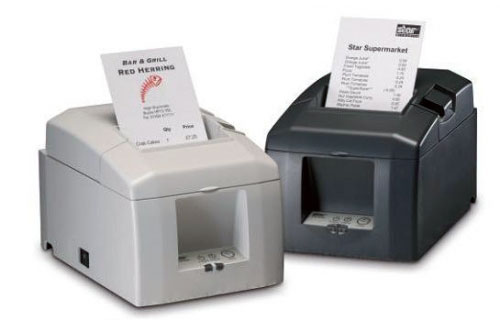 Overview
Overview
What started as utilizing a “leftover†from the previous owner turned into a dual-purpose printer in the busy kitchen at LaPiazza Italian Restaurant in Lititz, PA. When Guisippe Gambino and his family took over the property and established LaPiazza Restaurant over 2 years ago, as is normal when a new restaurant takes over an existing restaurant setup, some POS equipment is left behind from the former occupants. One piece of equipment that remained in the kitchen was the Star TSP650 thermal printer, along with a few rolls of MaxStick® paper.
Star TSP100 futurePRNT Receipt Printer is Pet Store Chain’s Best Friend
 Uncle Bill’s in one of the most successful pet store chains in Indianapolis, due in part to its highly successful marketing program that includes coupons with vibrant colors and eye-popping graphics. Unfortunately, their old POS system was a dog in terms of performance. Thanks to Star receipt printers, however, Uncle Bill’s new POS system is turning out to be their best friend.
Uncle Bill’s in one of the most successful pet store chains in Indianapolis, due in part to its highly successful marketing program that includes coupons with vibrant colors and eye-popping graphics. Unfortunately, their old POS system was a dog in terms of performance. Thanks to Star receipt printers, however, Uncle Bill’s new POS system is turning out to be their best friend.
Jumbo Chooses Zebra Label Printers to Improve Customer Service
 Jumbo is the largest toy retailer in Greece and customer service is at the top of its business agenda. Every day, hundreds of customers buy goods from its 35 stores. The company has an excellent reputation for offering the broadest selection of toys in the market at the best prices.
Jumbo is the largest toy retailer in Greece and customer service is at the top of its business agenda. Every day, hundreds of customers buy goods from its 35 stores. The company has an excellent reputation for offering the broadest selection of toys in the market at the best prices.
Customer service, reducing costs and improving productivity are key factors in helping Jumbo to drive and expand its business, and to achieve this, Jumbo recently decided to automate its labelling, price control and stock replenishment procedures.
Previously, such procedures were handled by a central PC workstation connected to a thermal printer in each store. Periodical stock replenishment was carried out manually by employees, who checked the shelves and recorded depleted items. This data was entered again manually into the workstation, and the stock replenishment list printed and forwarded to the outlet’s warehouse. Labels advertising prices, promotions and offers were arranged on the workstation, and printed on a thermal printer. When new stock was placed on the shelves, employees had to take the printed labels, go to the respective shelves and place them under the right items.
Introduction of mobile printers
Jumbo was already very familiar with automation, having first installed automated print procedures in 1996. However, to meet its key business objectives, Jumbo identified that it needed a faster and more flexible mobile printing application. The company was forced to seek a new supplier to help it achieve this, and turned to leading manufacturer of on-demand printing solutions, Zebra Technologies. Subsequently, Jumbo upgraded its stock replenishment system with Zebra QL 420 mobile printers.
Jones Dairy Farm Empowers Delivery Drivers with Wireless Computers, Printers
Challenge
Since Milo Jones sold his first sausage in 1889, the Jones Dairy Farm has been making great sausage in Fort Atkinson, Wisconsin, from a cherished family recipe. Today, six generations later, the Jones family still operates the original farm and maintains its high quality standards.
However, the company’s distribution has grown considerably. It now sells its products online, in stores across the country, as well as in Canada, Japan and Hong Kong. The innovative company was the first in the meat industry to quick-freeze, one of the first to introduce fully-cooked breakfast sausage, and was early to operate a modern bacteriological chemical laboratory.
More recently, Jones Dairy decided to implement a direct store delivery (DSD) application with elements of route accounting for enhanced efficiency and customer service. Previously, Jones Dairy delivery staff had to go back and forth to their trucks to gather and print data for transactions, relying on manual entry using pen and paper forms.
Solution
Jones Dairy coupled Motorola® MC70 mobile computers with Zebra’s RW 420 mobile printers.
British Sky Broadcasting Improves Customer Service with the Intermec CN3
British Sky Broadcasting uses the Intermec CN3 to help improve service for its 9.2 million customers.
Mobile Printing Enables Charter Baking Company to Deliver the Freshest Organic Baked Goods On-time to Consumers Nationwide
Challenge
Headquartered in Boulder, Colorado, Charter Baking Company, a portfolio company of Charterhouse Group, Inc. and North America’s leading supplier of natural and organic bread and baked goods, is dedicated to bringing consumers a variety of the finest natural and organic breads without the use of any artificial ingredients or preservatives. The company distributes branded products from Rudi’s Organic Bakery, The Vermont Baking Company, The Baker, and Matthew’s Bread to supermarkets, mass retailers and a host of independent natural food stores across the U.S. In order to continue to ensure the freshness of its products, Charter Baking wanted to make sure all products were delivered accurately and on-time to meet its customers’ needs.
In 2007, Charter reached out a leading provider of handheld and host software to the route distribution and food processing industries. The company began its relationship when it bought Vermont Bakeries.
“We had been using a variety of disparate route accounting systems in various locales, including manual systems, and we were lacking the real-time visibility of inventory and sales data that could help us plan production for maximum sales, profitability and customer service,†said Andy Artzer, CIO of Charter Baking Company.
“Manual transactions at the store delivery level slowed down drivers’ productivity and efficiency and were a hindrance to our growth. In addition, the lack of real-time sales/inventory information and sales integration with our back-office planning system made forecasting and production planning a challenge. As a result, we experienced higher return rates in some regions or stores and out-of-stocks in others. Now, with the new system we can do more accurate forecasting by region and by store.â€
Based on its needs, Charter Baking selected a sales tracking, ordering, route settlement, mobile/wireless route accounting/direct-store-delivery solution. The application runs on any Microsoft Windows Mobile device and the Charter Baking implementation utilizes Motorola MC9090 rugged mobile computers with a keypad designed specifically for DSD and Zebra RW 420 mobile/wireless receipt printers. Transaction data from each route is uploaded
daily into Charter’s host system application called “Bakers Dozenâ€.
“We specified Zebra’s mobile technology as a result of an evaluation our company conducted on mobile printers in the marketplace, in which Zebra ranked highest on its usability, rugged construction, printing quality and superior battery life,†explains Artzer. “With the old system it was difficult to decipher the drivers’ handwriting. Now, with the mobile printers, all the printouts are clear and legible.â€
Using the handheld mobile/wireless solution, Charter’s drivers can complete delivery route transactions quickly and conveniently. With the mobile computer and printer, Charter’s mobile workers can issue invoices, print receipts, collect signatures, enter credits for returns and accept payments on the spot, then communicate these transactions to the host system. Product and quantity data can be entered either by scanning the product’s UPC code or entering the number into the handheld.
“Implementing the system has helped us streamline delivery operations for drivers and provides us with significantly greater accountability and accuracy on product sales across all locations,†states Artzer. “As a result, we can identify and optimize sales opportunities and ensure that production, distribution and product placement are done in the most advantageous manner to serve our customers.â€



